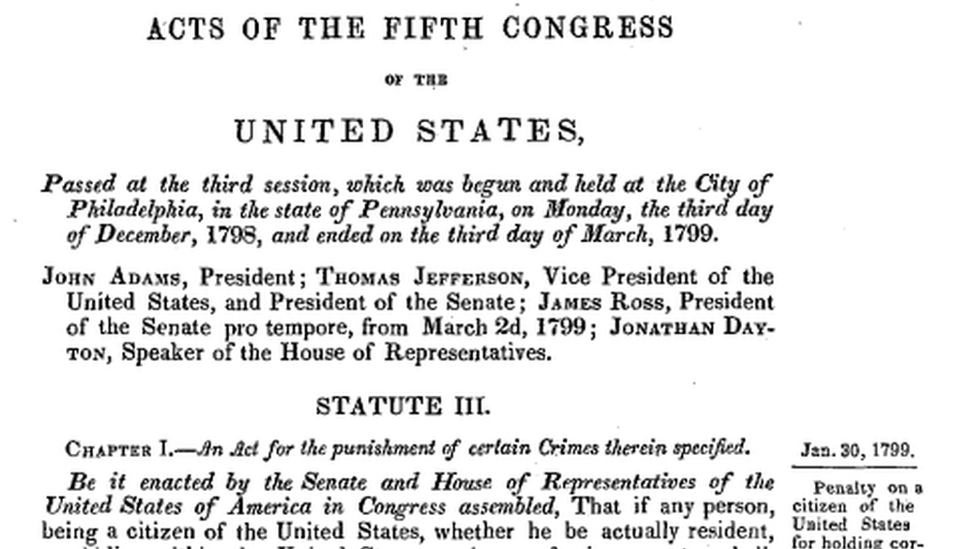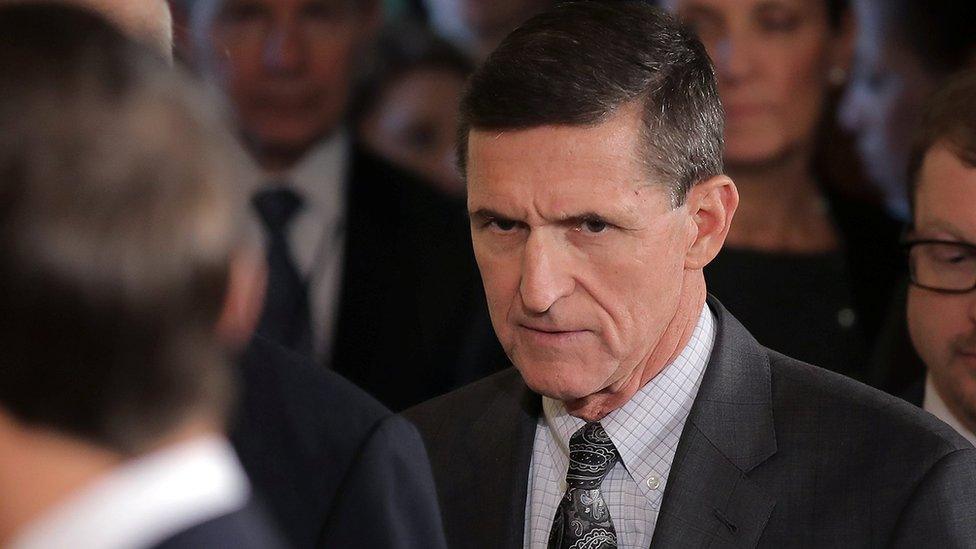What is the US Logan Act?
- Published

A passage from the act passed by the Fifth Congress in 1798
As a political row grows over the resignation of US National Security Adviser Michael Flynn, who reportedly misled officials over his discussions with Russia about sanctions, there are also claims that he may have broken a law - known as the Logan Act - by conducting diplomacy with a foreign party before President Trump took office.
What is the Logan Act?
It is a federal law (1 Stat. 613;, external18 U.S.C. §953, external) aimed at preventing private citizens from conducting foreign affairs without the permission or involvement of the US government.
It states:
"Any citizen of the United States, wherever he may be, who, without authority of the United States, directly or indirectly commences or carries on any correspondence or intercourse with any foreign government or any officer or agent thereof, with intent to influence the measures or conduct of any foreign government or of any officer or agent thereof, in relation to any disputes or controversies with the United States, or to defeat the measures of the United States, shall be fined under this title or imprisoned not more than three years, or both.
This section shall not abridge the right of a citizen to apply, himself or his agent, to any foreign government or the agents thereof for redress of any injury which he may have sustained from such government or any of its agents or subjects."
How did it come about?
The act was passed by the Fifth Congress in 1798 and signed into law by President John Adams in 1799.
It was last amended in 1994, and violation of the act is a felony.
Why is it called the Logan Act?
It was named after Dr George Logan, a state legislator in Pennsylvania, who in 1798 travelled to France and engaged in negotiations there as a private citizen amid rising tensions between the two countries over America's debt to Paris.
Just days after his talks, France took a series of steps to ease the tensions - however, historians still dispute whether Logan's personal initiative was the primary cause of the de-escalation or whether it was a mere coincidence that Paris acted on a decision that had already been made.
Nevertheless, back in the US the Federalist Party voiced its anger and suspicion about Logan's activities and forced through the Act.
Has anyone been prosecuted under the Logan Act?
No.
In fact, only one person has ever been indicted for breaching it.
In 1803, a jury indicted Francis Flourney, a Kentucky farmer, after he wrote an article advocating a separate nation in the western part of the US that would be allied with France.

Michael Flynn encouraged a softer policy on Russia and a harder line on Iran
However, the farmer was never prosecuted.
The act has been mentioned on a number of occasions during major US political scandals in the past 40 years.
In 1975, two US senators were accused of violation of the act after they travelled to Cuba for talks with communist officials.
In 1984, President Ronald Reagan argued that Rev Jesse Jackson should be prosecuted for travelling to Cuba and Nicaragua.
Most recently, in July 2016, then presidential candidate Donald Trump was accused by several US senators of breaching the law. This followed his public comments in which he appeared to have encouraged Russian spy agencies to hack his rival Hillary Clinton's emails.
However, none of the accusations led to prosecutions.
Could Michael Flynn be prosecuted?
The Washington Post argues that the act is mostly used as "a political weapon for the opposition party to cast doubt on the other party's foreign policies".
Still, Congressional democrats John Conyers and Elijah Cummings have demanded a classified briefing to Congress on Michael Flynn by the justice department and FBI.
US House Intelligence Committee Chairman Devin Nunes has said he wants to investigate the leaks that led to Mr Flynn's resignation.
Meanwhile, several House Democrats have called on Oversight Committee Chairman Jason Chaffetz to launch an investigation into Mr Flynn's ties to Russia.